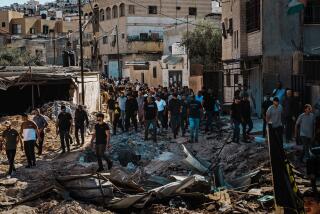NATO Troops Tear Down Sarajevo’s ‘Berlin Wall’
- Share via
SARAJEVO, Bosnia-Herzegovina — Amid reports of harassment of elderly non-Serbs in a Serb-held district of Sarajevo, NATO peacekeepers moved Tuesday to eliminate the last and most symbolic checkpoint dividing the city.
In an unannounced but long-anticipated operation, French troops dismantled the ugly barriers of blue metal and concrete that had set apart the Serb-held district of Grbavica, where U.N. officials and residents have reported a wave of intimidation and beatings of non-Serbs in recent days.
Grbavica is one of several Serbian suburbs that, under the U.S.-brokered peace accord for Bosnia-Herzegovina, will be transferred to Muslim-Croat government authority in a process to begin Saturday, when all Serbian forces have to withdraw. Fear of the transfer has sent thousands of Serbs fleeing for refuge elsewhere in Bosnian Serb territory.
The barricade blocking access to Grbavica had come to symbolize the insurmountable ethnic division created by the war; it was the closest thing to a Berlin Wall that Sarajevo had, located in the middle of the capital across the ill-named Brotherhood and Unity Bridge.
Its continued presence, long after checkpoints elsewhere in the country had fallen, violated the ideal of free movement set forth in the peace accord and seemed to encourage the Bosnian Serbs and the Muslim-led government to persist in restricting the movement of civilians.
A somewhat stunned Bosnian Serb police officer watched the French bulldoze the barriers, and a civilian woman exclaimed, “I don’t believe it!”
In Grbavica, a handful of Muslim residents have told U.N. fieldworkers of being visited by armed “thugs” who steal their possessions and order them to leave town.
The incidents in Grbavica come as many Serbs feel forced to flee, or at least to remove their possessions--including the bodies of their loved ones dug up from local cemeteries--before the advent of Muslim-Croat rule.
One resident told The Times of two Muslim friends who were beaten in separate incidents late last week by men who barged into their apartments. One of the victims, a retired pediatrician, opened her door to the men when they pretended to need a doctor for a sick child, according to the source, a non-Serb woman who has lived in Grbavica all her life. Then they roughed up the doctor and stole her TV set.
“There are gangs who rob, steal and maltreat people, especially Muslims,” the woman said. “We always had them here, but now it is at a peak, what with the people leaving and everything.”
U.N. officials said the authorities in Grbavica professed outrage and blamed the incidents on uncontrollable rogue elements. But because police and military security in Grbavica is so tight, the officials doubted that local authorities, who will lose their jobs under the peace accord, did not know about the harassment campaign.
“It’s hard for us to tell whether it is steered or not steered,” Kris Janowski, spokesman for the U.N. refugee relief agency, said Tuesday. “There is pressure; there is harassment. We don’t know how widespread it is. We may be just seeing the tip of the iceberg.”
U.N. officials have been able to document only half a dozen cases of abuse in Grbavica but believe that the incidents are part of a larger campaign. All involved elderly non-Serbs who were told to leave by men breaking into their homes. Most victims are too frightened to speak to U.N. investigators or anyone else, Janowski said.
With the deadline looming for the transfer of the Serbian suburbs to government rule, diplomats predicted an increasingly tense situation. They accused the Bosnian Serb leadership of fanning fears to provoke a mass exodus because allowing Serbs to stay and live with Muslims and Croats would undermine the notion of ethnic segregation that was the basis of the Serbian war effort.
Up to a quarter of the Serbs in Sarajevo suburbs, or about 15,000 to 25,000 people, have left, U.N. officials said.
Asked whether they could better protect the Muslims, Croats and other non-Serb civilians in Grbavica, spokesmen for the North Atlantic Treaty Organization-led peace Implementation Force, or IFOR, reiterated that their mandate does not include police work.
“We are concerned” about the reports, said Capt. Mark Van Dyke, spokesman for U.S. Adm. Leighton W. Smith, commander of the NATO forces in Bosnia. “We have told our forces to look out for violence.”
But he said that placing IFOR troops in the role of police would constitute mission creep--the expanding of duties into murky areas beyond the original mandate.
Meanwhile, in the latest meeting aimed at building contact between the Bosnian enemies, the Serbs’ second-ranking official, Nikola Koljevic, came to Sarajevo on Tuesday to talk about upcoming elections and the problem of the suburbs.
Koljevic, thought at one time to be a potential replacement for Bosnian Serb leader Radovan Karadzic, was the most senior Bosnian Serb official to visit Muslim-held territory since the war began nearly four years ago.
“I must say I feel rather strange and nostalgic,” Koljevic said. “But it is good that we met here. It is good that people meet again and talk to each other.”
More to Read
Sign up for Essential California
The most important California stories and recommendations in your inbox every morning.
You may occasionally receive promotional content from the Los Angeles Times.














